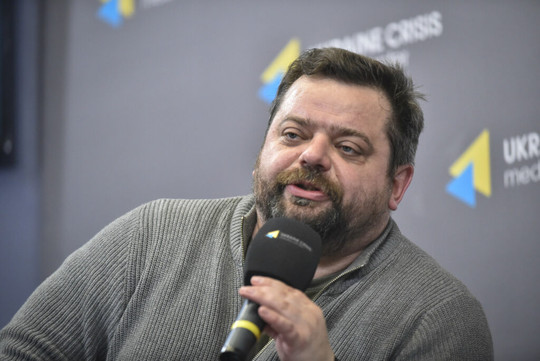Ukraine: “In times of war, journalists become targets of information attacks”

To mark the two years since Russia’s full-scale invasion of Ukraine, the International and the European Federations of Journalists (IFJ-EFJ) conversed with Serhiy Shturkhetskyy, chairperson of the Independent Media Trade Union of Ukraine (IMTUU) to examine how the reality of Ukrainian journalists have changed and what the journalistic community and sister unions can do to continue supporting journalists on the ground.
How is the situation on the ground and how do you feel?
The situation remains dire. With a devastated economy, cities raised to the ground and occupied, families divided, constant rocket and drone attacks, there is no place in the country where you can feel safe. Editorial offices are forced to reduce their staff, many journalists have been mobilised, and women have fled the country. The situation with labour rights has worsened. There used to be problems, but now employers solve most of their problems at the expense of their employees.
What are the most pressing needs for journalists in Ukraine two years after the beginning of the Russian invasion of Ukraine?
First, there is still a serious security threat. Today, of course, the situation is not as critical as it was when the occupiers seized settlements and neither journalists nor entire newsrooms had time to evacuate. Nowadays, journalists who have some experience and training are working at the frontline. But in any case, journalists still need training in physical security and first aid. Along with physical safety, the issue of information and digital security is also a pressing one.
In times of war, journalists become targets of information attacks, and journalists can be used to spread disinformation and propaganda. Therefore, information and digital security training sessions remain relevant. The psychological health of both Ukrainians and journalists is also under threat. Constant stress and shelling make it impossible to live and work normally. At the same time, most journalists do not perceive the need to seek psychological help or promote psychological assistance among their colleagues and the public. Due to the catastrophic shifts in the Ukrainian media market caused by the war, we are talking about the danger of a sharp reduction in the number of journalists and editorial offices. Therefore, another important task is to increase the competitiveness of Ukrainian journalists and improve their skills, especially in the field of new media.
How has the war affected the work of the Independent Media Trade Union of Ukraine? What has your union been doing to help its members? Please, provide concrete examples. Is there a difference between women and men’s demands?
There is no need to talk about internal organisational problems now. These challenges are serious, but they are insignificant compared to the tragedies of people and the tragedy of war. Today, the union has no paid staff, and contributions are paid voluntarily. The number of registered members has been halved and now stands at 600. Most of them are women. Despite the difficulties, the union members continue to pay their dues, which is used to administer press cards, legal assistance, financial aid, and free rental of bulletproof vests. Thanks to cooperation with international organisations, one year ago, we managed to run a Journalistic Solidarity Centre in Lutsk, four Starlink stations and four generators ensured the continuity of journalists’ work despite blackouts.
Last year, psychological training sessions, lectures and workshops were held on countering propaganda and challenges related to artificial intelligence. We provide ongoing consulting and legal support on labour law issues. Last year alone, more than 400 people took part in online events organised by the trade union, and more than 200 in offline events.
How can unions and the journalistic community help Ukrainian journalists?
I would ask you to be more attentive to our Ukrainian women journalists who were forced into exile. This is a long war, so they may have to stay for a while. Think of them not as competitors, but as friends who need your support and your professional knowledge and can be useful to you.
Therefore, we ask our colleagues for help in organising training sessions, generalising experience through the creation of training programmes, conducting retreats and programmes to promote psychological assistance, training and transferring professional skills and experience to Ukrainian colleagues, and joining forces to counter propaganda and disinformation.
I am also convinced that only the solidarity of journalists across Europe and the world will allow us to ensure accountability for Russian propagandists who discredit the title of journalist.
- Please donate to the IFJ/EFJ Safety Fund for Journalists in Ukraine to support Ukrainian journalists in need.
- More information about IFJ-EFJ work to support affiliates and journalists in Ukraine: here











